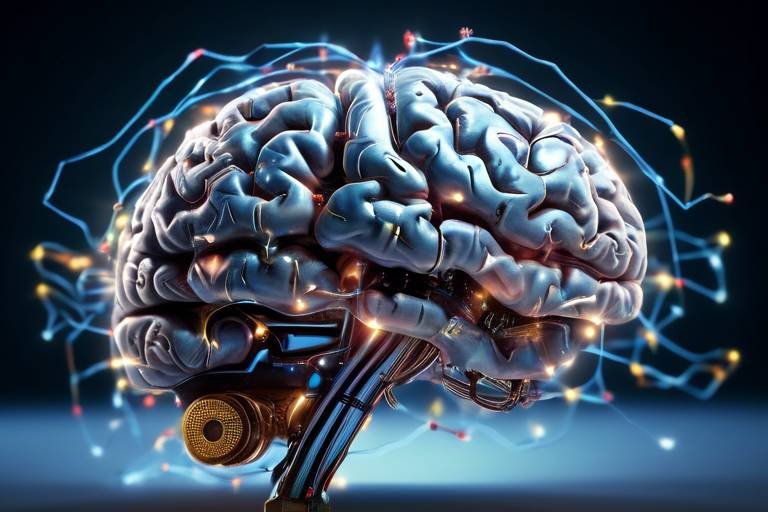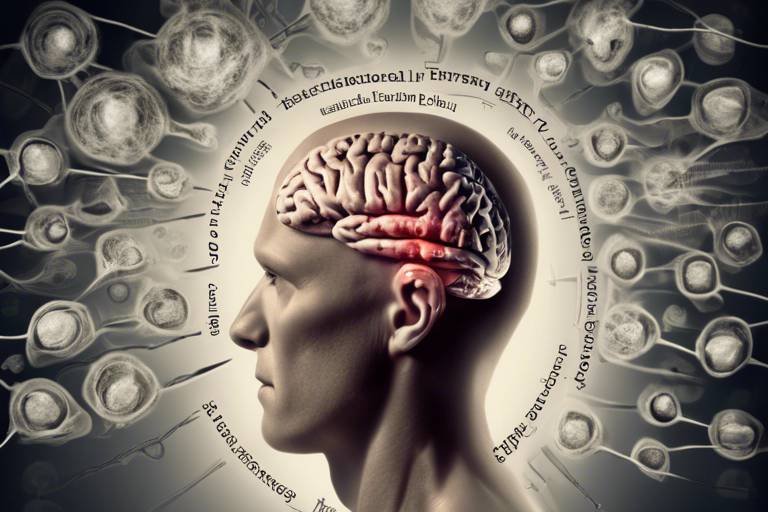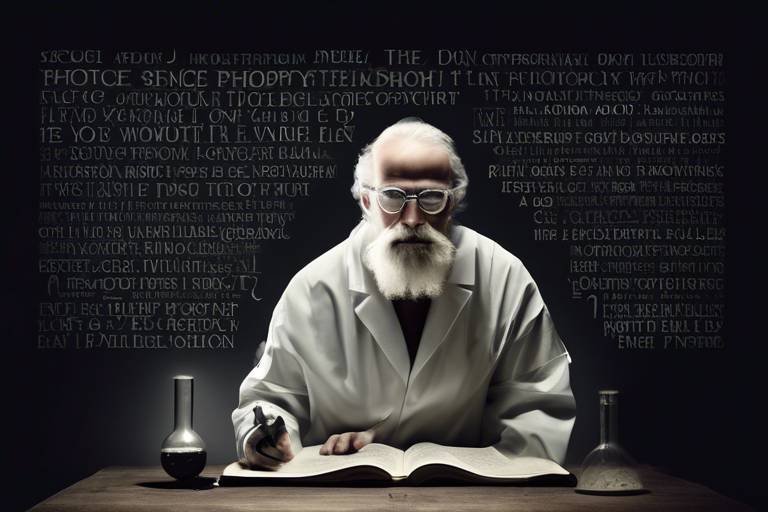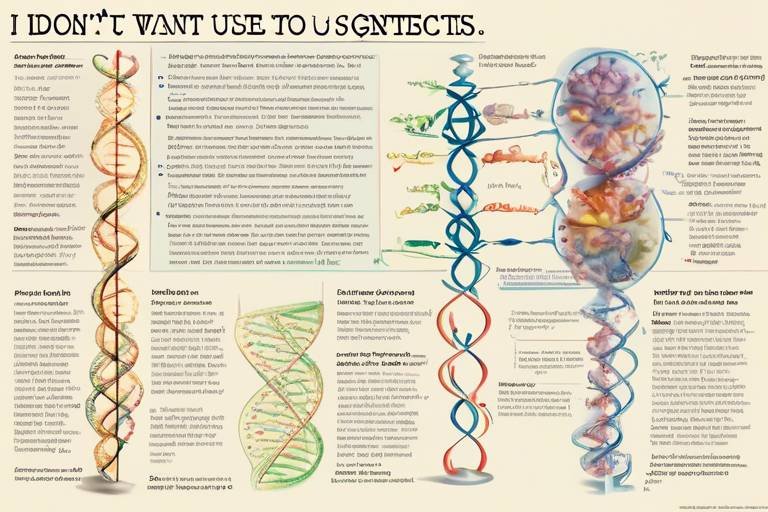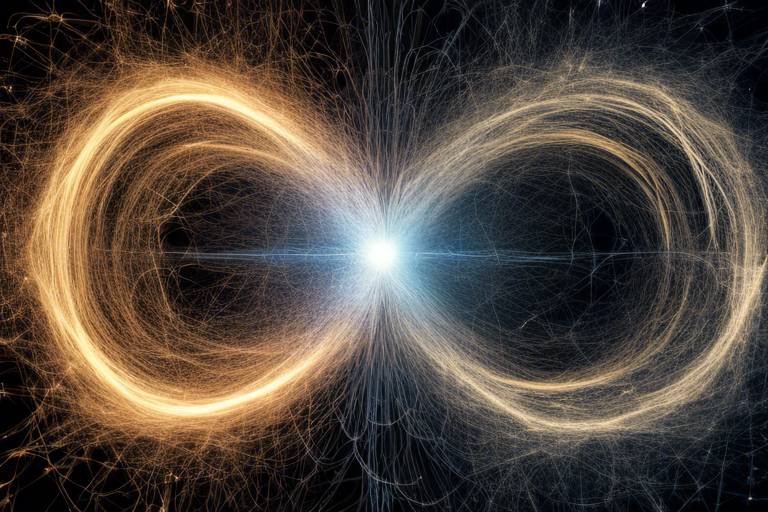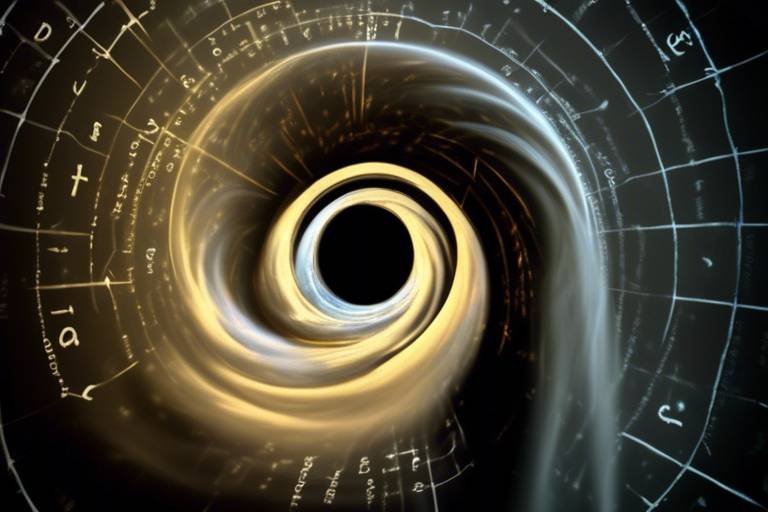Is the Human Brain - A Quantum Computer?
The idea that the human brain might operate like a quantum computer is not just a wild fantasy; it's a fascinating hypothesis that has captured the imagination of scientists and thinkers alike. Imagine your brain as a complex network, not just firing neurons but perhaps dancing to the tune of quantum mechanics. This notion suggests that our cognitive processes, emotions, and consciousness could be influenced by phenomena that are typically reserved for the subatomic world. But what does this really mean? Could our thoughts and memories be the result of quantum states, and if so, how does this change our understanding of ourselves and the universe?
As we delve deeper into this topic, we encounter a blend of neuroscience and quantum physics, two fields that, at first glance, seem worlds apart. Yet, the intersection of these disciplines may hold the key to unlocking some of life's most profound mysteries. For instance, consider how quantum mechanics introduces concepts like superposition and entanglement—could these principles be at play in the way our brains process information? The implications are staggering, not just for neuroscience but also for artificial intelligence, potentially leading to machines that think and learn in ways that mimic human cognition.
To fully appreciate the quantum brain theory, we need to explore the scientific underpinnings and the experimental evidence supporting or challenging this idea. While some researchers are optimistic about the potential for quantum effects in brain function, others remain skeptical, citing challenges in proving these theories. The debate is ongoing, and as we unravel the complexities of both the brain and quantum mechanics, we may find ourselves on the brink of revolutionary breakthroughs that could redefine our understanding of consciousness itself.
In this article, we will journey through the various aspects of the quantum brain theory, examining its implications for artificial intelligence, consciousness, and even the philosophical questions it raises about free will and identity. So, buckle up as we explore whether the human brain truly operates like a quantum computer, and what that could mean for the future of science and technology.
- What is the quantum brain theory? The quantum brain theory posits that quantum mechanics may play a role in cognitive processes and consciousness.
- How does quantum mechanics relate to neuroscience? Quantum mechanics introduces concepts that could potentially explain complex neural processes, suggesting a deeper connection between the two fields.
- What are the implications for artificial intelligence? Understanding the brain as a quantum computer could lead to more advanced AI models that mimic human thought processes.
- Are there any experiments supporting this theory? Some studies have explored quantum coherence in biological systems, but the evidence is still debated within the scientific community.
- What challenges does the quantum brain theory face? Skepticism from scientists and limitations in current research methods present significant challenges to validating this theory.

The Quantum Brain Theory
The concept of the Quantum Brain Theory is a fascinating intersection of neuroscience and quantum physics that suggests our brains might operate on principles similar to those of a quantum computer. Imagine your brain as a complex network of neurons, not just firing signals like a traditional computer but also entangled in a dance of quantum states. This theory proposes that quantum mechanics could play a vital role in cognitive processes, such as decision-making, perception, and even consciousness itself.
At its core, the Quantum Brain Theory challenges the classical view of brain function. Instead of merely processing information in a linear fashion, it posits that the brain may harness the peculiarities of quantum mechanics, such as superposition and entanglement, to achieve a level of processing power and efficiency that is currently beyond our understanding. Think of it like a multi-dimensional chess game where each piece can exist in multiple states simultaneously, allowing for a more intricate and holistic approach to problem-solving.
One of the pivotal ideas within this theory is the notion of quantum coherence. This refers to the ability of quantum states to exist in a synchronized manner, potentially enabling neurons to communicate and process information in ways that classical physics cannot explain. In simpler terms, it's as if the neurons in our brains are not just isolated entities but are part of a larger, interconnected web of quantum activity. This could lead to a deeper understanding of how we think, feel, and experience consciousness.
However, the Quantum Brain Theory is not without its critics. Many scientists remain skeptical, arguing that the brain is too warm and noisy for quantum effects to play a significant role in its functioning. To illustrate this, consider a delicate crystal that can only maintain its structure in a perfectly controlled environment. The brain, with its fluctuating temperatures and chaotic interactions, might not provide the ideal conditions for quantum phenomena to thrive.
Nonetheless, the exploration of this theory is opening up new avenues for research. By bridging the gap between neuroscience and quantum physics, researchers are beginning to investigate how these fields can inform one another. For instance, understanding quantum processes could lead to breakthroughs in how we approach cognitive disorders, artificial intelligence, and even the fundamental nature of reality itself.
In summary, the Quantum Brain Theory invites us to rethink our understanding of the human mind. It challenges us to consider whether our cognitive processes could be influenced by the mysterious principles of quantum mechanics, ultimately pushing the boundaries of both neuroscience and physics. As we delve deeper into this intriguing hypothesis, we may uncover insights that not only expand our knowledge of the brain but also reshape our perception of consciousness and existence.

Neuroscience Meets Quantum Physics
The intersection of neuroscience and quantum physics is a fascinating realm that invites us to rethink our understanding of both the brain and the universe. Imagine a world where the very fabric of our thoughts and consciousness is woven from the threads of quantum mechanics. Sounds like science fiction, right? Yet, emerging research suggests that the complexities of the human brain may indeed share similarities with the principles of quantum physics. This convergence raises profound questions about how we perceive reality and our cognitive processes.
At the core of this discussion is the idea that the brain operates not just through classical neural networks but may also harness quantum phenomena. While traditional neuroscience focuses on neurons and synapses, quantum neuroscience posits that quantum states could influence brain activity. For instance, consider the concept of quantum entanglement, where particles become interconnected in ways that classical physics cannot explain. If similar processes occur in the brain, it could revolutionize our understanding of memory, perception, and even consciousness itself.
One of the most intriguing aspects of this intersection is the potential for collaborative breakthroughs. Neuroscientists and quantum physicists can learn from one another, merging insights from both fields to explore questions that have long puzzled humanity. For example, the way information is processed in the brain could parallel quantum computing methods, where data is stored and processed in fundamentally different ways compared to classical computers. This could lead to new models of artificial intelligence that mimic human thought processes more accurately than ever before.
To illustrate this relationship, consider the following table that summarizes key differences and similarities between classical neuronal functions and quantum processes:
| Aspect | Classical Neuroscience | Quantum Neuroscience |
|---|---|---|
| Information Processing | Sequential and deterministic | Non-linear and probabilistic |
| Data Storage | Neural networks | Quantum states and superposition |
| Interconnectivity | Synaptic connections | Quantum entanglement |
| Consciousness | Emergent from neural activity | Potentially influenced by quantum effects |
Despite the exciting possibilities, the journey of merging these two fields is not without its challenges. Many scientists remain skeptical, questioning whether the brain operates at quantum levels at all. The complexities of measuring quantum effects in biological systems present significant hurdles, leading to ongoing debates about the validity of the quantum brain theory. However, as technology advances, we may gain new tools to explore these uncharted territories.
In conclusion, the dialogue between neuroscience and quantum physics opens up a world of possibilities. As we continue to explore the ways in which these disciplines can inform and enhance one another, we inch closer to unraveling the mysteries of the brain and the very nature of consciousness itself. Who knows? This could lead us to groundbreaking discoveries that redefine our understanding of reality.

Quantum Coherence in Neurons
The concept of quantum coherence in neurons is a captivating area of study that bridges the realms of neuroscience and quantum physics. Imagine a symphony where each musician must not only play their instrument but also be in perfect harmony with one another to create a beautiful melody. Similarly, neurons in our brain might operate under a set of quantum rules that allow them to function in a coordinated manner, potentially enhancing their ability to process information. This idea suggests that the brain could be more than just a complex network of biological components; it may also utilize the principles of quantum mechanics to achieve a level of processing that classical systems cannot.
At its core, quantum coherence refers to the phenomenon where particles exist in multiple states at once and can become entangled, sharing information instantaneously across distances. In the context of neurons, this could imply that the firing patterns of neurons are not merely the result of chemical signals but may also involve quantum states that allow for a more sophisticated form of communication. For instance, if a neuron can exist in a superposition of states, it might process multiple inputs simultaneously, leading to faster and more efficient cognitive functions.
Research into this intriguing hypothesis has led scientists to explore various models that could explain how quantum effects might manifest in biological systems. One such model involves the role of microtubules, which are structural components within neurons. These microtubules could potentially harbor quantum states, allowing for coherence and entanglement. The implications of this are profound, as it suggests that our brains might be capable of complex computations that are fundamentally different from those performed by traditional computers.
However, the exploration of quantum coherence in neurons is not without its challenges. The biological environment of the brain is notoriously noisy, and maintaining quantum states in such conditions is a significant hurdle. Yet, some researchers argue that the brain's unique architecture might provide the necessary conditions for quantum effects to thrive, leading to a deeper understanding of consciousness and cognitive processing.
In summary, the idea of quantum coherence in neurons opens up exciting possibilities for understanding how our brains work. It challenges the traditional views of cognition and invites us to reconsider the fundamental nature of thought and consciousness. As we delve deeper into this field, we may uncover not only the secrets of the human mind but also pave the way for revolutionary advancements in technology and artificial intelligence.
- What is quantum coherence? Quantum coherence is a phenomenon where particles exist in multiple states simultaneously and can become entangled, allowing for instantaneous information sharing.
- How could quantum coherence affect brain function? If neurons can utilize quantum coherence, they may process information more efficiently and rapidly than previously thought, leading to enhanced cognitive abilities.
- What role do microtubules play in this theory? Microtubules are proposed to be structures within neurons that may support quantum states, facilitating quantum coherence and complex information processing.
- Are there any challenges to studying quantum effects in the brain? Yes, the biological environment is noisy, making it difficult to maintain quantum states; however, some researchers believe the brain's architecture might mitigate these challenges.

Experimental Evidence
The quest to understand whether the human brain operates akin to a quantum computer has led researchers down a rabbit hole of experimental evidence that both supports and challenges this captivating theory. One of the most compelling aspects of this research is the exploration of quantum effects in biological systems, particularly within the neural networks of the brain. Scientists have been investigating how quantum phenomena, such as coherence and entanglement, might play a role in cognitive processes.
For instance, a groundbreaking study conducted by Dr. Anirban Bandyopadhyay at the National Institute for Materials Science in Japan revealed that certain proteins in the brain exhibit quantum behavior. This discovery suggests that quantum coherence could potentially influence how neurons communicate and process information. The implications of such findings are profound, as they hint at the possibility that our thoughts and consciousness might be shaped by quantum mechanics.
Furthermore, researchers have attempted to replicate these findings in various experimental setups. One notable experiment involved the use of optical traps to observe the behavior of microtubules—structures within neurons that are believed to play a critical role in cellular processes. This study showed that these microtubules could maintain quantum states for longer than expected, suggesting that they might be integral to understanding the brain's quantum-like processing capabilities.
However, while some studies present intriguing evidence of quantum effects in neural activity, skepticism remains prevalent in the scientific community. Critics argue that the brain is too warm and noisy for quantum states to be sustained, a phenomenon known as decoherence. This raises a significant question: can quantum mechanics truly operate within the biological confines of the human brain? To address this, researchers have been conducting more rigorous experiments to either validate or refute the quantum brain theory.
In summary, while the experimental evidence surrounding the quantum brain theory is still evolving, the findings thus far are both exciting and contentious. They open up a world of possibilities, suggesting that our understanding of consciousness and cognition may be intertwined with the principles of quantum mechanics. As we delve deeper into this frontier, it becomes increasingly clear that interdisciplinary collaboration will be essential in unraveling the mysteries of the brain.
As we continue to explore the experimental evidence, it’s crucial to remain open-minded yet critical. The journey of understanding the brain's potential quantum nature is akin to navigating uncharted waters; it requires both courage and curiosity. So, what’s next? Only time and continued research will tell.
- What is the quantum brain theory?
The quantum brain theory posits that quantum mechanics may play a role in cognitive processes and consciousness, suggesting that the brain functions similarly to a quantum computer. - What experimental evidence supports this theory?
Studies have shown that certain proteins in the brain exhibit quantum behavior, and microtubules may maintain quantum states, indicating a potential link between quantum mechanics and neural activity. - What are the challenges faced by this theory?
Challenges include skepticism about the feasibility of quantum effects in the warm, noisy environment of the brain, as well as limitations in current research methods. - How could this theory impact artificial intelligence?
Understanding the brain as a quantum computer could lead to the development of more advanced computational models and enhance machine learning capabilities.

Challenges to the Theory
The idea that the human brain operates like a quantum computer is certainly captivating, but it comes with a host of challenges and skepticism from the scientific community. One of the primary hurdles is the lack of empirical evidence supporting quantum processes in biological systems. While quantum mechanics has been extensively studied in physics, applying these principles to neuroscience is still in its infancy. The brain is an incredibly complex organ, and isolating quantum effects amidst the noise of classical neural activity is no small feat.
Another significant challenge arises from the environmental conditions within the brain. Quantum states, such as superposition and entanglement, are notoriously fragile and can be easily disrupted by thermal noise and decoherence. The warm and wet environment of the brain raises questions about whether quantum coherence can be maintained long enough to influence cognitive processes. Some researchers argue that the brain operates at a scale where classical physics predominates, making the quantum brain theory less plausible.
Moreover, there is a considerable debate within the scientific community regarding the interpretation of quantum mechanics itself. Different interpretations, such as the Copenhagen interpretation or many-worlds theory, lead to various implications about consciousness and cognition. This lack of consensus complicates efforts to establish a unified framework that incorporates both neuroscience and quantum physics.
To further illustrate these challenges, consider the following table summarizing key points of skepticism:
| Challenge | Description |
|---|---|
| Lack of Evidence | Insufficient experimental data supporting quantum effects in the brain. |
| Decoherence Issues | Quantum states may not survive in the brain's warm and wet environment. |
| Interpretational Disagreements | Diverse interpretations of quantum mechanics lead to conflicting implications. |
| Complexity of the Brain | The intricate functioning of neurons makes isolating quantum effects difficult. |
Lastly, the quantum brain theory also faces a broader philosophical challenge. If the brain were indeed a quantum computer, what would that mean for our understanding of free will and consciousness? Would our thoughts and decisions be merely the result of quantum processes, stripping away the essence of human agency? These questions not only perplex scientists but also philosophers, making the discourse around the quantum brain theory rich yet contentious.
In conclusion, while the quantum brain theory opens exciting avenues for exploration, the challenges it faces cannot be overlooked. Addressing these hurdles will require collaborative efforts across disciplines, combining insights from neuroscience, physics, and philosophy to unravel the mysteries of the human brain.
- What is the quantum brain theory? The quantum brain theory suggests that quantum mechanics may play a role in cognitive processes and consciousness.
- Why is there skepticism about the theory? Skepticism arises from a lack of empirical evidence, issues with maintaining quantum states in the brain, and differing interpretations of quantum mechanics.
- Can quantum effects influence neural activity? Some researchers believe that quantum coherence could influence neural activity, but this remains a topic of ongoing debate.
- What are the philosophical implications? If the brain operates as a quantum computer, it raises questions about free will, identity, and the nature of reality.

Implications for Artificial Intelligence
The exploration of the human brain as a potential quantum computer opens up a fascinating world of possibilities for the field of artificial intelligence (AI). Imagine if we could harness the principles of quantum mechanics to enhance machine learning models and computational capabilities! The implications could be monumental, leading us to rethink not just how machines learn, but how they interact with the world around them.
At the heart of this discussion is the idea that if the brain indeed operates on quantum principles, then replicating these mechanisms in AI could yield systems that are not only faster but also more efficient in processing complex data. Traditional computers, which rely on binary logic, may find themselves outmatched by quantum systems that can exist in multiple states simultaneously. This could mean that AI could perform tasks that are currently deemed too complex or time-consuming, such as simulating human emotions or understanding nuanced language.
For instance, let's consider quantum neural networks. These networks could potentially mimic the way our brains process information, utilizing quantum bits (qubits) rather than classical bits. This shift could allow AI to handle vast amounts of data at unprecedented speeds. Imagine a world where AI can analyze medical data and predict health outcomes with a level of accuracy that rivals human intuition. This isn't just science fiction; it's a glimpse into a future where AI systems could revolutionize industries like healthcare, finance, and beyond.
However, the journey toward this quantum leap in AI is not without its challenges. While the theoretical framework is exciting, practical implementations are still in their infancy. Researchers are grappling with how to effectively create quantum algorithms that can be integrated into existing AI frameworks. Additionally, the complexity of quantum mechanics means that developing a comprehensive understanding of how these principles can be applied in AI requires a multidisciplinary approach, bridging gaps between neuroscience, computer science, and physics.
Furthermore, we must consider the ethical implications of creating AI that operates on quantum principles. With the power to process information at lightning speed, there are concerns about privacy, security, and the potential for misuse of such technology. As we stand on the brink of this new frontier, it is crucial that we engage in conversations about the moral responsibilities that come with such advancements.
In summary, the implications of viewing the human brain as a quantum computer for artificial intelligence are vast and profound. While we are still at the beginning of this exploration, the potential for breakthroughs in machine learning and data processing is immense. As we continue to unravel the mysteries of the brain and quantum mechanics, we may find ourselves equipped with the tools to create AI systems that not only mimic human cognition but also enhance our understanding of intelligence itself.
- What is the quantum brain theory? The quantum brain theory posits that quantum mechanics could play a role in cognitive processes and consciousness.
- How could quantum mechanics improve AI? By applying quantum principles, AI systems could process data more efficiently and perform complex tasks faster than traditional models.
- What are the ethical concerns surrounding quantum AI? There are concerns about privacy, security, and the potential misuse of powerful AI technologies that may arise from quantum computing.

Consciousness and Quantum Mechanics
When we dive into the relationship between consciousness and quantum mechanics, we enter a realm that feels almost like science fiction. Imagine for a moment that our thoughts, feelings, and perceptions aren't just the byproducts of neurons firing in a predictable manner, but rather influenced by the mysterious laws of quantum physics. This idea isn't just a whimsical notion; it’s a serious hypothesis that has captivated scientists and philosophers alike.
The crux of the argument is that quantum phenomena—like superposition and entanglement—could play a crucial role in how we experience consciousness. For instance, consider the concept of superposition, where particles exist in multiple states at once until observed. Could our thoughts also exist in a state of potentiality, only crystallizing into reality when we become aware of them? This tantalizing possibility raises profound questions about the nature of decision-making and free will.
Moreover, some researchers propose that the brain operates at a quantum level, facilitating faster and more complex information processing than classical models can explain. If true, this could mean that our consciousness is not just a product of biological processes but also a manifestation of quantum interactions. It’s as if the brain is a quantum orchestra, where each neuron plays its part in a symphony of awareness, influencing the entire composition of our thoughts and experiences.
Yet, this theory is not without its challenges. Critics argue that the warm, wet environment of the brain is not conducive to quantum states, which typically require isolation from external disturbances to function effectively. This skepticism is grounded in a solid understanding of both neuroscience and quantum physics, making it a significant hurdle for proponents of the quantum brain theory.
To explore these ideas further, researchers are conducting experiments aimed at uncovering any quantum effects in neural activity. For example, the concept of quantum coherence in neurons suggests that quantum states could influence how neurons communicate and process information. This might explain some of the more enigmatic aspects of consciousness, such as intuition or creativity, where the brain seems to connect disparate ideas in a flash of insight.
As we continue to investigate this fascinating intersection of consciousness and quantum mechanics, we must also consider the philosophical implications. What does it mean for our understanding of free will if our thoughts are influenced by quantum mechanics? How do we define identity in a world where consciousness could be a quantum phenomenon? These questions challenge our fundamental beliefs about reality and our place within it.
In summary, the relationship between consciousness and quantum mechanics is a complex and evolving field of study. As we peel back the layers of our understanding, we may find that the universe operates on principles far more intricate than we can currently comprehend. This journey into the unknown not only enhances our grasp of the brain but also invites us to reconsider the very nature of existence itself.
- What is the quantum brain theory? The quantum brain theory suggests that quantum mechanics may play a role in cognitive processes and consciousness.
- How does quantum mechanics relate to consciousness? It proposes that quantum phenomena could influence how we think and experience awareness.
- Are there any experiments supporting this theory? Yes, researchers are investigating quantum coherence in neurons to see if quantum effects impact brain function.
- What challenges does the quantum brain theory face? Skepticism from the scientific community and the brain's warm, wet environment are significant challenges.

Philosophical Considerations
The exploration of whether the human brain operates like a quantum computer opens up a treasure trove of philosophical questions that challenge our understanding of existence, consciousness, and free will. If our brains do leverage quantum mechanics, what does that imply about the nature of our thoughts and decisions? Are we merely biological machines, or do we possess a deeper, quantum essence that allows for true creativity and free will?
To illustrate this, consider the analogy of a computer program running on a classical machine versus one running on a quantum computer. The classical program follows a linear path, executing one instruction at a time, while the quantum program can explore multiple possibilities simultaneously thanks to superposition. If our brains function similarly, it could mean that our thought processes are not just a series of reactions but rather a complex web of possibilities, constantly evolving and adapting.
This leads us to ponder the concept of free will. If quantum processes influence our decision-making, are we truly in control of our choices? Some philosophers argue that if our minds are influenced by quantum randomness, then our sense of agency may be an illusion. Others contend that this randomness could actually enhance our capacity for free will, allowing us to break free from deterministic patterns of thought.
Moreover, the implications extend into the realm of identity. If our consciousness is a product of quantum processes, how do we define who we are? Are we simply the sum of our experiences, or is there a quantum thread that connects our past, present, and future selves? This perspective could lead to a more fluid understanding of identity, where we are not fixed entities but rather dynamic beings, constantly reshaped by our interactions with the universe.
In addition to free will and identity, the quantum brain theory challenges our understanding of reality itself. If consciousness can influence quantum states, as some interpretations of quantum mechanics suggest, then the act of observing reality may play a more significant role than we previously thought. This raises profound questions about the nature of existence: Is reality a fixed construct, or is it a malleable entity shaped by our perceptions and consciousness?
Ultimately, these philosophical considerations urge us to reflect on our place in the universe. They invite us to ask challenging questions about what it means to be human in a world where consciousness may be intertwined with the fundamental fabric of reality. As we continue to delve into the mysteries of the brain and quantum mechanics, the answers we uncover could reshape not only our understanding of ourselves but also the very nature of existence.
- What is the quantum brain theory? The quantum brain theory suggests that quantum mechanics may play a role in cognitive processes and consciousness.
- How does quantum mechanics relate to free will? If quantum processes influence decision-making, it raises questions about the nature of free will and whether our choices are truly our own.
- What are the implications for our understanding of identity? The theory may suggest that identity is not fixed but fluid, shaped by quantum interactions and experiences.
- Does consciousness affect reality? Some interpretations of quantum mechanics suggest that consciousness may influence quantum states, challenging our understanding of reality.

Future Research Directions
As we stand on the brink of a new era in neuroscience and quantum physics, the potential for future research directions is both exciting and vast. The intersection of these two fields could lead to groundbreaking discoveries that reshape our understanding of the brain and consciousness. One of the most intriguing avenues for exploration is the development of interdisciplinary approaches. By combining insights from physics, biology, computer science, and psychology, researchers can create a more holistic understanding of how quantum mechanics might influence cognitive processes.
Another promising direction is the advancement of experimental techniques. As technology evolves, we have the opportunity to design more sophisticated experiments that can test the predictions of quantum brain theory. For instance, utilizing advanced imaging techniques could help visualize quantum coherence in neurons, revealing whether quantum states play a role in information processing. This could be akin to using a microscope to unveil the hidden details of a complex painting, allowing us to see the intricate brushstrokes that contribute to the masterpiece.
Moreover, researchers should consider the implications of quantum effects on neural networks. By investigating how quantum principles could enhance our understanding of neural connectivity and the dynamics of information flow, we may unlock new pathways towards developing more efficient artificial intelligence systems. Imagine a future where AI not only mimics human thought but also leverages quantum phenomena to solve complex problems in ways we can’t yet imagine.
Additionally, exploring the potential for quantum computing technologies to model brain functions could open up new frontiers in both neuroscience and AI. By simulating brain processes on quantum computers, we could test hypotheses about consciousness and cognition that are currently beyond our reach. This would be like having a supercharged calculator that can solve problems in seconds that would take classical computers eons.
Finally, the philosophical implications of these findings warrant attention. As we probe deeper into the nature of consciousness through the lens of quantum mechanics, we must also grapple with profound questions about free will, identity, and reality itself. Future research should not only focus on empirical data but also engage with the philosophical ramifications of our discoveries, fostering a dialogue between scientists and philosophers.
In summary, the future of research in the realm of the quantum brain theory is rich with possibilities. By embracing interdisciplinary collaboration, advancing experimental techniques, exploring quantum effects in neural networks, leveraging quantum computing technologies, and addressing philosophical questions, we can pave the way for a deeper understanding of the brain and consciousness. The journey ahead promises to be as exhilarating as it is enlightening, pushing the boundaries of what we know about ourselves and the universe.
- What is the quantum brain theory? The quantum brain theory suggests that quantum mechanics may play a role in cognitive processes and consciousness.
- How could quantum mechanics influence AI? Understanding the brain as a quantum computer could lead to more advanced AI models that mimic human thought processes more accurately.
- What are the challenges faced by researchers in this field? Researchers encounter skepticism from the scientific community and limitations in current research methods, making it difficult to gather conclusive evidence.
- Why is interdisciplinary collaboration important? Combining insights from various fields can lead to a more comprehensive understanding of complex issues like consciousness and cognition.
Frequently Asked Questions
- What is the quantum brain theory?
The quantum brain theory suggests that the human brain may utilize principles of quantum mechanics to facilitate cognitive processes and consciousness. This theory posits that quantum phenomena, like superposition and entanglement, could play a role in how we think and process information.
- How does neuroscience intersect with quantum physics?
Neuroscience and quantum physics intersect in their exploration of complex systems. By applying quantum principles to neural processes, researchers hope to uncover new insights into brain function and consciousness. This collaboration could lead to groundbreaking discoveries that enhance our understanding of both fields.
- What is quantum coherence, and how does it relate to neurons?
Quantum coherence refers to the ability of quantum states to exist in multiple states simultaneously. In the context of neurons, it suggests that quantum effects could influence how neurons communicate and process information, potentially affecting cognitive functions.
- Is there experimental evidence supporting the quantum brain theory?
Yes, there are several studies that provide experimental evidence for quantum effects in brain function. However, this area of research is still in its infancy, and many findings are subject to debate. Key studies have shown potential quantum phenomena in biological systems, lending some support to the theory.
- What are the main challenges to the quantum brain theory?
The quantum brain theory faces skepticism from the scientific community, primarily due to the difficulty in measuring quantum effects in the brain. Additionally, the complexity of brain processes makes it challenging to establish a clear link between quantum mechanics and cognitive functions.
- How could understanding the brain as a quantum computer impact artificial intelligence?
If the brain operates like a quantum computer, it could revolutionize artificial intelligence by leading to the development of more advanced computational models. This understanding could enhance machine learning algorithms and improve AI's ability to process information and learn from experiences.
- What is the relationship between consciousness and quantum mechanics?
The relationship between consciousness and quantum mechanics is a fascinating area of study. Some theorists propose that quantum mechanics may provide insights into the nature of consciousness itself, potentially explaining how subjective experiences arise from physical processes in the brain.
- What philosophical implications arise from the quantum brain theory?
The quantum brain theory raises profound philosophical questions about free will, identity, and the nature of reality. If our thoughts and consciousness are influenced by quantum mechanics, it challenges traditional views of determinism and the self, prompting deeper inquiries into what it means to be human.
- What future research directions are suggested by the quantum brain theory?
Future research in this area could focus on interdisciplinary collaboration between neuroscience and quantum physics, exploring new experimental techniques to study brain function. There are also opportunities for investigating the implications of quantum mechanics on consciousness and cognitive processes.

